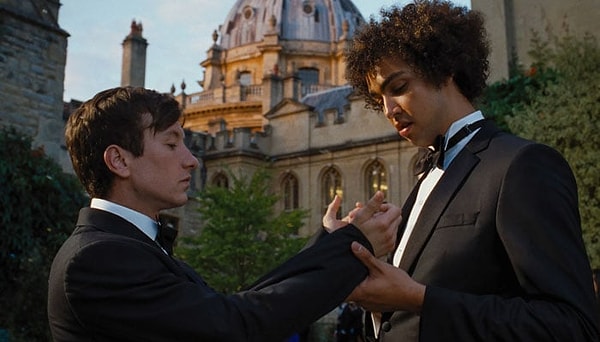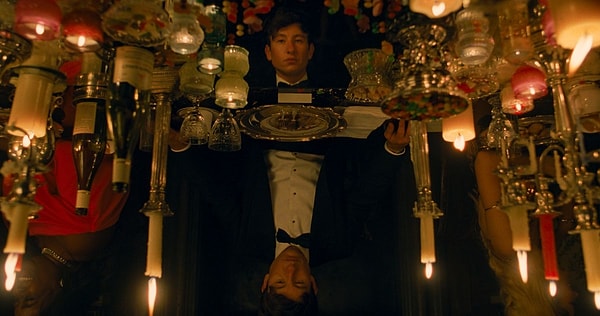Saltburn's Ending Explained: Deception, Desire, and the Dark Dance of Oliver Quick
In the realm of filmmaker Emerald Fennell, where outrage meets audacity, the ending is often a carnival of twists and montages. If 'Promising Young Woman' left you breathless, then 'Saltburn' takes the death count and multiplies it, weaving a tale of class warfare, murder, and a surreal dance sequence within the stolen walls of an aristocratic mansion. The question arises: How did Saltburn arrive at this chaotic crescendo, and does its final act leave us cathartic or confused? Let's delve into the enigmatic conclusion that Fennell crafts with both brilliance and bewilderment.

The narrative of Saltburn unfolds through the lens of Oliver Quick (Barry Keoghan), an anti-hero whose complex relationship with Felix Catton (Jacob Elordi) serves as the focal point. Oliver's disdain for women and ambiguous feelings toward Felix set the stage for a story that begins in 2006 when the two first cross paths at Oxford. A scholarship kid, Felix is ignored by his posh peers, and Oliver's intervention marks the genesis of a relationship that transcends friendship, laced with obsession and manipulation.
As Oliver navigates the aristocratic world of the Catton family at their estate, Saltburn, suspicions arise, and tensions mount. The film skillfully captures Oliver's increasing depravity and initially suggests an inevitable downfall. Yet, Fennell swerves away from the expected, and the story transforms into a grand narrative about Oliver and the entire Catton family. In a series of shocking revelations, Saltburn's last minutes take a sharp turn from a tale of obsession to something far more elaborate.

Felix's death becomes a catalyst, splintering the Catton family, and Oliver's intricate plan unfolds. The film exposes Oliver as a cunning mastermind who sought not only revenge but also the wealth and the Saltburn estate of the Cattons. What initially seemed like a story of one-on-one obsession now extends into a saga of vengeance and manipulation. Oliver's misdeeds, including sabotaging Felix's bike, faking financial woes, framing others, and orchestrating deaths, are laid bare in a dramatic montage.
The film's final act reveals that Oliver's narration, which we assumed to be part of an inquisition or cross-examination, is, in fact, an admission. In a James Bond–villain–esque monologue delivered to a comatose Elsbeth, Oliver unveils the extent of his lies and crimes. The revelation culminates in a chilling scene where Oliver gazes at a shadowbox of marionettes adorned with stones bearing the names of the Cattons—a macabre celebration of the family's demise.

However, this extravagant ending raises questions. The film's broadness and the late-breaking revelations challenge its own precision and moral ambiguity. The meticulously crafted dynamic between Oliver and Felix loses some of its sharpness as the narrative broadens to critique every wealthy individual, and Oliver's intelligence and abilities are exaggerated to accommodate the plot twists. The film's strength lies in exploring the moral murkiness of whether Felix or Oliver is worse and the implications of their parasitic relationship. Still, the elaborate ending sacrifices some of this precision for a grandiose twist.

Emerald Fennell's choice to turn Saltburn into a tale of eating the rich invites a reconsideration of seemingly cutesy dialogues. Lines that once felt like misunderstandings of Oliver's desires take on a different tone when Oliver indeed becomes the man who coveted the house all along. The film concludes with Oliver reveling in the demise of the Catton family, portrayed through a misdirection that pulls at the strings of the narrative.

In the end, Saltburn's concluding moments are a tapestry of dark revelations and unexpected turns. Fennell, known for her audacious storytelling, leaves the audience torn between admiration for the film's audacity and a lingering sense of confusion. As Oliver Quick orchestrates his grand finale, the strings of deception, desire, and dark dances are pulled one last time, leaving viewers to ponder the true cost of revenge and the blurred lines between hero and villain.
Keşfet ile ziyaret ettiğin tüm kategorileri tek akışta gör!


Send Comment